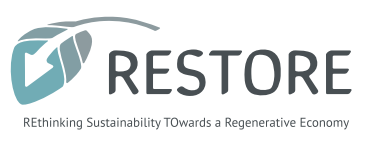
The EU COST RESTORE Website is now at www.eurestore.eu
Overview:
Sustainable buildings and facilities are critical to a future that is socially just, ecologically restorative, culturally rich and economically viable within the climate change context
Despite over a decade of strategies and programmes, progress on built environment sustainability fails to address these key issues. Consequently the built environment sector no longer has the luxury of being incrementally less bad, but, with urgency, needs to adopt net-positive, restorative sustainability thinking to incrementally do ‘more good’.
Within the built environment sustainability agenda a shift is occurring, from a narrow focus on building energy performance, mitigation strategies, and minimisation of environmental impacts to a broader framework that enriches places, people, ecology, culture, and climate at the core of the design task, with a particular emphasis on the salutogenic benefits towards health.
Sustainability in buildings, as understood today, is an inadequate measure for current and future architectural design, for it aims no higher than trying to make buildings “less bad”. Building on current European Standards restorative sustainability approaches can and will raise aspirations and deliver restorative outcomes.
The RESTORE Action will affect a paradigm shift towards restorative sustainability for new and existing buildings across Europe, promoting forward thinking and multidisciplinary knowledge, leading to solutions that celebrate the richness of design creativity while enhancing users’ experience, comfort, health, wellbeing and satisfaction inside and outside buildings, and in harmony with urban and natural ecosystems, reconnecting users to nature.
The COST proposal will advocate, mentor and influence for a restorative built environment sustainability through work groups, training schools (including learning design competitions) and Short Term Scientific Missions (STSMs).
Keywords: restorative sustainability, restorative design processes-methods-tools, climate change, health, wellbeing, sustainable urban development, social, ecology, built environment.
The Working Groups
Working Group Zero: Project Coordination
The general coordination, administration and communications activities of the project. It includes the Management Committee (MC) members.
Working Group One: Restorative Sustainability
The Evolving Agenda of Restorative Design, which introduces the evolving spectrum of paradigms, design challenges, opportunities, and perspectives for sustainable architecture and urban design. It discusses the knowledge, skills, and competence that should inform and orient the practice shift required by an approach to architecture informed by restorative sustainability.
Working Group Two: Restorative Design Process
Processes, Methods and Tools for Restorative Design. Primarily based on case studies derived from workshops, it constitutes the core of the action and intends to provide “hands-on” guidance to the practice of restorative design
Working Group Three: Restorative Buildings & Operations
Impact and innovations for a restorative approach to construction and operations (facilities management).
Working Group Four: Rethinking Technology
Impact and innovations for a restorative approach to construction and operations (facilities management).
Working Group Five: Scale Jumping
Thinking beyond the building, identifying scale jumping potentials to neighbourhood and city level sustainability.
 COST (European Cooperation in Science and Technology) is a pan-European intergovernmental framework. Its mission is to enable break-through scientific and technological developments leading to new concepts and products and thereby contribute to strengthening Europe’s research and innovation capacities.
COST (European Cooperation in Science and Technology) is a pan-European intergovernmental framework. Its mission is to enable break-through scientific and technological developments leading to new concepts and products and thereby contribute to strengthening Europe’s research and innovation capacities.It allows researchers, engineers and scholars to jointly develop their own ideas and take new initiatives across all fields of science and technology, while promoting multi- and interdisciplinary approaches. COST aims at fostering a better integration of less research intensive countries to the knowledge hubs of the European Research Area. The COST Association, an International not-for-profit Association under Belgian Law, integrates all management, governing and administrative functions necessary for the operation of the framework. The COST Association has currently 36 Member Countries. http://www.cost.eu

